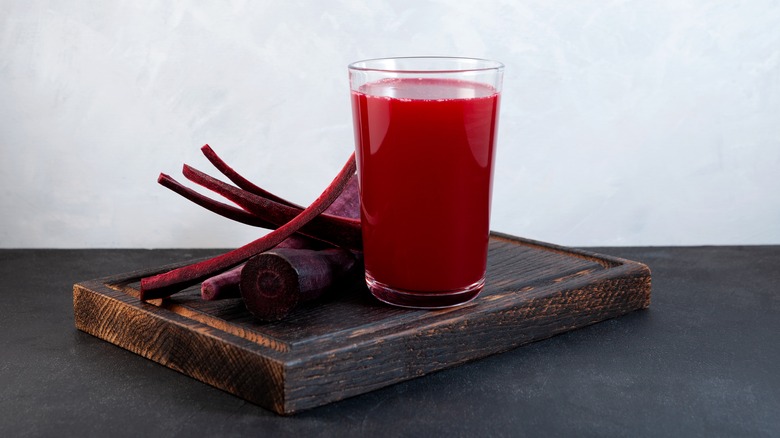Can Beet Juice Help Prevent Cancer?
Beetroot, also known as beet, is a vibrant vegetable known for its aroma, earthy flavor, and reddish pigment. The vegetable comes packed with various nutritional benefits. It's a great source of essential vitamins and minerals like potassium, iron, and vitamin C (via Healthline). Raw and cooked beetroot respectively contain about 70% to 80% of their carbs in the form of simple sugars like glucose and fructose, with a glycemic index (GI) score of 61 and a glycemic load of 5. This means beetroot won't significantly increase your blood sugar levels after a meal. According to the U.S. Department of Agriculture (USDA), beetroot is an abundant source of dietary fiber. A single cup of beets carries 3.81 grams of fiber. Dietary fiber is important for healthy digestion and can help reduce your susceptibility to constipation (via WebMD).
Beetroot may also be helpful for fitness enthusiasts. A 2017 study published in Nutrients revealed that trained cyclists who supplemented beet juice experienced a 0.8% improvement in their performance after a 50-mile test. The University of South Australia explains that the nitrate levels in beetroot help boost blood flow, increasing oxygen delivery to the muscles for faster performance. However, further research is needed to confirm the impact of beetroot on exercise performance, especially for female athletes, says MedicalNewsToday.
Since beetroot contains vitamin B9 (folate), it helps cells grow and remain healthy, says WebMD. Furthermore, the vegetable's leaves and roots have substantial antioxidant and anti-inflammatory properties. Due to these properties, claims have emerged regarding beetroot's potential to cure cancer. Some have been researched, while others are mere hype statements. Here's what we know.
What the research says about beet juice for cancer prevention
Beetroot's nutritional content makes the vegetable a superfood with numerous health benefits. But how specifically might beet juice help with cancer? The red color of this root vegetable is caused by certain compounds called betalains, which appear to have cancer-protective elements based on a number of lab studies, per the American Insitute for Cancer Research. According to a 2021 article published in the journal Oncogen, betanin pigments in beets were found to inhibit pro-inflammatory enzymes, helping to curtail tumor cell growth in various organs, including the colon, nerve, lung, stomach, and prostate.
One 2021 study published in the Journal of Cancer Prevention states that beetroot is an abundant source of polyphenolic and flavonoid components that contribute to the root vegetable's anti-inflammatory and antioxidant capacities. According to the study, supplementing beetroot may help prevent cancer and manage unwanted chemotherapy side effects. Furthermore, male rats treated with beetroot juice had reduced DNA damage and restored antioxidant enzyme activities, says the study.
Note that these lab studies don't directly prove the anti-cancer benefits of beet. However, their results encourage researchers to delve deeper into the value of beets for cancer treatment and prevention.


